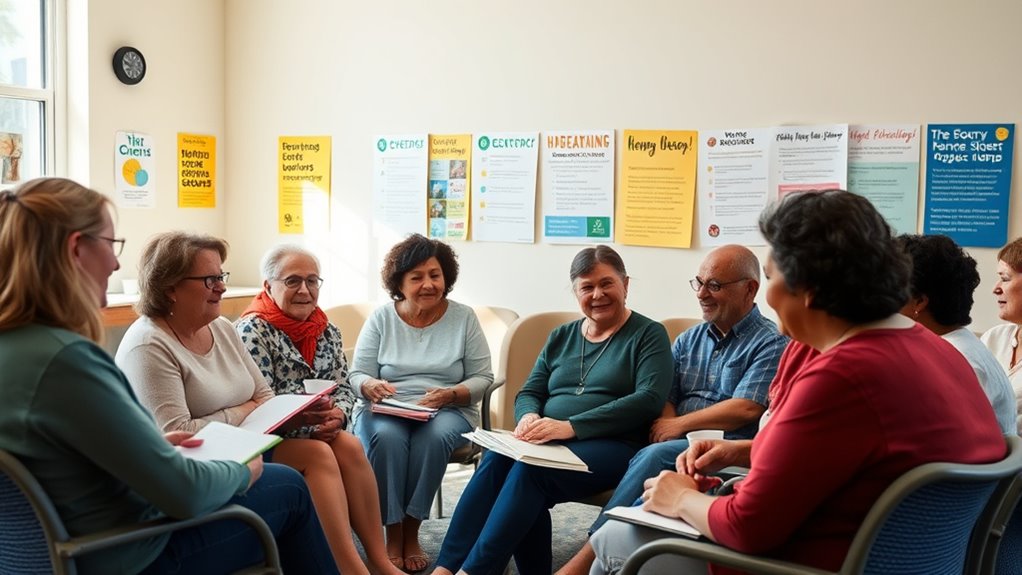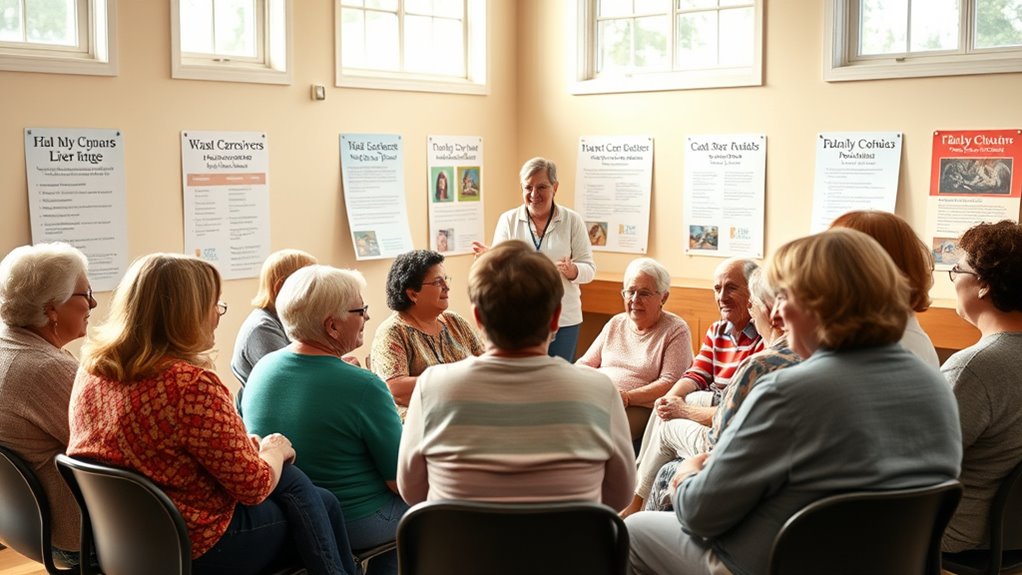Support groups and community resources are essential for family caregivers, offering a safe space to share experiences, vent frustrations, and connect with others who understand your challenges. They come in local and virtual formats, helping reduce feelings of isolation and stress. Respite care, educational programs, counseling, and financial assistance are some resources that support your well-being and caregiving journey. Exploring these options can strengthen your support network and boost your resilience—discover more helpful strategies to sustain your caregiving role.
Key Takeaways
- Support groups provide a safe space for caregivers to share experiences, vent frustrations, and reduce feelings of isolation.
- Participating in support groups enhances emotional well-being and fosters a sense of community and belonging.
- Respite care offers temporary relief, helping caregivers prevent burnout and maintain mental health.
- Community resources include educational programs, counseling, financial aid, and support initiatives tailored for caregivers.
- Accessing online and local resources, understanding caregiver rights, and engaging with support programs strengthen caregiving capacity.

Caring for a loved one can be both rewarding and overwhelming, but you don’t have to do it alone. Many family caregivers find themselves juggling multiple responsibilities, often neglecting their own mental health in the process. That’s where support groups and community resources come into play, offering essential relief and connection. Support groups provide a safe space where you can share your experiences, vent frustrations, and learn from others who truly understand what you’re going through. These groups can be local or virtual, making it easier to find a community that fits your schedule and comfort level. Participating regularly helps reduce feelings of isolation and stress, which are common among caregivers. Knowing you’re not alone in your journey can boost your resilience and mental health, enabling you to face daily challenges with greater strength.
Respite care is another fundamental resource designed to give you a break from your caregiving duties. It involves temporary care services that allow you to step away, rest, or tend to your own needs without worrying about your loved one’s well-being. Respite care can take many forms, from in-home assistance to short-term stays at care facilities. Taking regular breaks is essential for maintaining your mental health, preventing burnout, and refueling your emotional reserves. When you access respite care, you give yourself the opportunity to recharge, attend to personal appointments, or simply enjoy some time alone or with friends. This rejuvenation isn’t just a luxury; it’s a necessity for sustaining your caregiving role over the long term. Utilizing community resources can also connect you with educational programs, counseling services, and financial assistance tailored specifically for family caregivers. Additionally, understanding caregiver rights and protections can empower you to advocate more effectively for your needs and those of your loved one. Moreover, many communities offer support programs that provide ongoing guidance and resources to help you navigate the complex landscape of caregiving.
In short, leveraging these community resources can greatly improve your quality of life as a caregiver. They empower you to care for your loved one while also protecting your mental health. Remember, seeking help isn’t a sign of weakness—it’s a proactive step toward sustaining your well-being and ensuring your loved one receives the best care possible. You don’t have to carry the entire burden alone; support is available, and it’s within your reach. Community engagement can further strengthen your network and provide additional avenues for assistance and support. Recognizing the importance of support groups and community involvement is essential to building a sustainable caregiving routine.
Frequently Asked Questions
How Can I Find Local Support Groups in My Area?
To find local support, start by searching online for community resources in your area. Check websites like Meetup, local health department pages, or caregiver organizations. You can also ask your healthcare provider for recommendations. Visiting community centers or libraries can reveal bulletin boards with local support group listings. Connecting with other caregivers online can provide insights into nearby groups. These steps help you access the support network you need.
Are Online Support Groups Effective for Family Caregivers?
Think of online support groups as a lighthouse guiding you through stormy seas. Virtual support offers a safe harbor where you can connect with peers anytime, anywhere. It’s effective because it fosters peer connection, providing emotional relief and practical advice. While not a complete substitute for face-to-face interaction, it’s a valuable resource that helps you feel less isolated, offering comfort and understanding during challenging caregiving moments.
What Financial Assistance Options Are Available for Caregivers?
You can access various financial assistance options as a family caregiver. Look into government grants designed to support caregiving costs, which can help offset expenses. Additionally, explore financial aid programs available through local agencies or non-profits, offering direct support or reimbursements. These resources can ease your financial burden, ensuring you get the help you need while caring for a loved one. Always check eligibility criteria and application deadlines.
How Do I Balance Caregiving With My Personal Health?
Balancing caregiving with your personal health requires setting boundaries, practicing self-care strategies, and prioritizing your well-being. You need to recognize your limits, schedule regular breaks, and stay consistent with stress management techniques like deep breathing or exercise. By nurturing yourself, you guarantee you’re strong enough to care for others, creating a sustainable balance. Remember, caring for yourself isn’t selfish — it’s essential for effective caregiving and maintaining your health.
What Legal Resources Can Help With Caregiving Decisions?
When facing caregiving decisions, legal resources can be invaluable. Seek legal advice to understand your rights and responsibilities, ensuring you’re making informed choices. Familiarize yourself with caregiving laws in your state, which may include power of attorney, guardianship, or healthcare directives. Consulting an attorney or legal aid organization can help clarify complex issues, protect your loved one’s interests, and give you peace of mind as you navigate caregiving responsibilities.
Conclusion
Remember, you’re not alone on this journey. Just like a lighthouse guides ships safely to shore, support groups and community resources can steer you through challenging times. One caregiver shared how attending a local support group felt like finding a compass in a storm, helping her navigate her loved one’s needs with renewed confidence. Reach out, connect, and let these resources be your steady beam of hope—because together, you can weather any storm.









